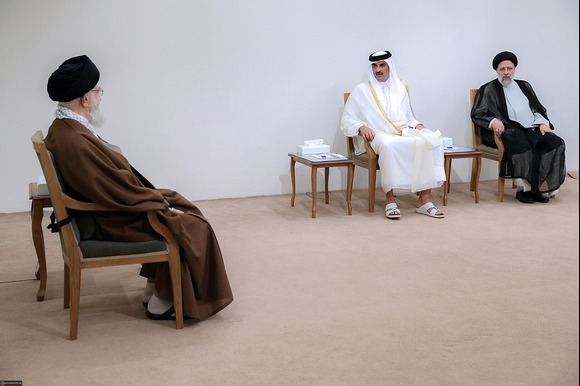Iranian President Masoud Pezeshkian has expressed “regret” to Qatar’s Emir Sheikh Tamim bin Hamad Al Thani following Tehran’s missile strike on a US military installation in Qatar earlier this week.
In a phone conversation on Tuesday, Pezeshkian clarified that the missile barrage targeting Al Udeid Air Base—a major US installation and the largest in the Middle East—was not intended to threaten Qatar or its people. “The State of Qatar was never the target of the operation, nor is its population,” the Diwan, the emir’s office, said in a statement quoting the Iranian president. Pezeshkian reaffirmed Qatar’s status as a “neighbouring, Muslim, and sisterly state,” and expressed hope that bilateral relations would continue to be rooted in mutual respect for sovereignty and principles of good neighbourliness.
According to Qatar’s Ministry of Interior, Iran launched 19 missiles at the US base on Monday. Qatari defence forces intercepted 18 of them, officials confirmed. The attack, claimed by Iran’s Islamic Revolutionary Guard Corps (IRGC), was described as a “powerful and devastating missile assault” and was said to be a direct response to a US strike on Iran’s nuclear facilities the day before.
The missile barrage triggered flares and loud explosions across Doha and other parts of Qatar, but the Al Udeid Air Base had been evacuated in advance of the assault, minimizing potential casualties or damage. Despite the absence of direct injuries, the act has deeply unsettled the Qatari leadership.
The Emir of Qatar strongly condemned the Iranian strike, calling it a “flagrant violation” of Qatar’s sovereignty and airspace. “This attack is fundamentally incompatible with the values of good neighbourliness and the historically close relationship between our nations,” the Diwan stated. The Emir also reminded Iran of Qatar’s consistent diplomatic engagement with Tehran and its role as an advocate for regional dialogue.
Although Iran and Qatar have traditionally maintained warm relations and share common positions on several regional issues—including criticism of US and Israeli actions in the region—the missile strike has cast a shadow over their ties. At a news conference on Tuesday, Qatari Prime Minister Sheikh Mohammed bin Abdulrahman bin Jassim Al Thani acknowledged the incident had left a “scar” on the bilateral relationship, one that would take time to mend.
In a further diplomatic step, Qatar’s Foreign Ministry disclosed that it had sent a formal letter to United Nations Secretary-General António Guterres and the UN Security Council. The letter denounced the IRGC’s missile attack as an “extremely dangerous escalation” and warned that it posed a “direct threat to regional peace and security.”
The incident unfolded amid rising military exchanges between Iran and the United States, a confrontation fueled by the broader conflict between Israel and Iran. That conflict began on June 13, when Israel launched multiple strikes inside Iranian territory.
In the hours following Iran’s attack on the US base, US President Donald Trump announced late Monday that Israel and Iran had agreed to a ceasefire. However, both governments have since accused one another of violating the truce, casting doubt on its durability and raising fears of further destabilization in the region.






